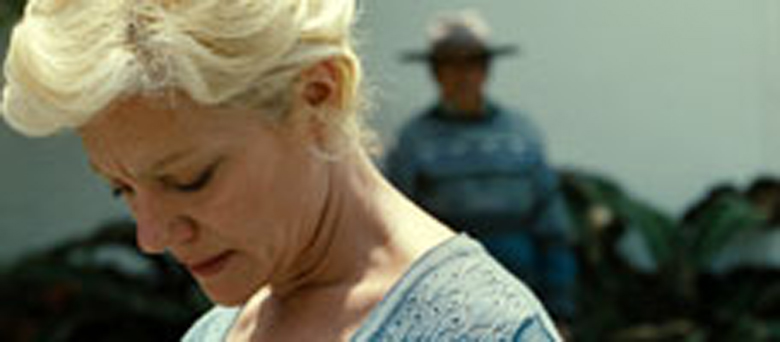Reviews
La mujer sin cabeza
Lucrecia Martel
Argentina / France / Italy / Spain, 2008
Credits
Review by Leo Goldsmith
Posted on 20 August 2009
Source Strand Releasing 35mm print
Related articles
Reviews
The Headless Woman by Jenny
External links
A fascinating interview with Lucrecia Martel by Chris Wisniewski at Reverse Shot
It happens quickly: The rigid framing of Vero’s profile jerks as she drives along an orange-gray dusty road; the steady hum of the car breaks with a bump in the road. She has hit something and stops, thinks, regains composure. After a moment’s pause, she straightens up and drives onward, and it is a painful few seconds before the film cuts to the rearview: a dog lying slumped on its side in the middle of the road.
But there’s more to it than that—or so we’re led to believe. Thinking and unthinking this moment, Vero drives on. A deluge comes, and we are already submerged in the dizzy consciousness of Lucrecia Martel’s The Headless Woman, haunted by this moment which seems to frame, question, and cast doubt upon all other matters. A trip to the hospital, an unspoken act of infidelity, a return to normal life: these events, both real and unreal, seem to drift past our vision as through the distracted purview of our dazed protagonist.
We understand from the beginning that Vero is a normal, bourgeois Argentine woman. She works as a dentist (also her brother’s profession), lives in a well-appointed modern home (managed by servants of less European extraction than their mistress), and expresses herself solely, it seems, through expensive, ever-changing hairstyles. After her accident, she is returned to her normal world as if to an alien landscape in which brash Latin men handle everything for their wives, who rove in gossipy, familial gangs. She wanders through dentist appointments and social obligations - the opening of a local pool, a birthday party for a senile aunt - with her ditzy disorientation all but unnoticed by those around her.
But this disorientation is Martel’s milieu, a half-awake state by which the viewer vaguely discerns the contours and conspiracies of wealthy men and women in the norther Argentinine of Salta. The film in some ways persists like a headwound head-trip, a blurry surface of dim forms that suggest Vero’s alternating numbness and guilt. But there is method to Martel’s hysteria: the sound design always leads us outside of a frame that seems unshakeable, inexorable. The camera’s composition anxiously holds on a hazy background of streetlights or a sketchy landscape viewed from the window of a car, waiting for a sharp foreground presence to ground us in the frame. In Martel’s films, it is this contrast - between the sharp, extreme closeup and the active, amorphous, and out-of-focus background - that creates tension and pulls us into the character’s consciousness. In every aspect of the film, Martel ensures that we are, like Vero, more concerned with what lies immediately in our narrow viewpoint than we are with the chatter just beyond it, like petty details of gardening and domesticity, or the ambient chit-chat about the flood and a missing boy.
As in her astonishing 2001 debut, La Ciénega, the sharp disparities of class, gender, and race in contemporary South America bubble to the murky surface in ways that are always unexpected: a sharp comment to the gardener, a dead animal’s blood draining in the sink, a husband’s phone call to a friend to “take care of things” discreetly. To put altogether too fine a point on it, Martel’s intuitive, anti-rational approach to issues of class and gender feels somehow feminine, hitting the spectator not analytically, but in the realm of the senses, much like Claire Denis’ work does. But this isn’t just ladies’ night hermeneutics. Lynch and Apichatpong are often mentioned as reference-points, and with good reason: Martel’s film operates on so subliminal a level, the viewer is often left scouring frame for clues, drawn deep into a mystery whose resolution is out of our hands, just out of view.
We don’t do comments anymore, but you may contact us here or find us on Twitter or Facebook.



